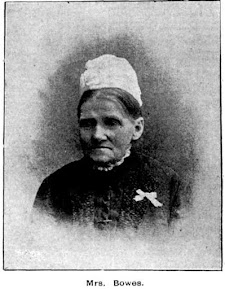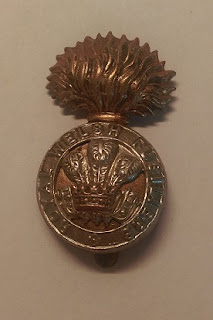Secrets and Scandals discovered in Section 1
Recently the Helping Hands
Gardening Group - an offshoot of the Friends of Rookwood - have been
"liberating" headstones and monuments from a forest of overgrowth in
Section one of the Old Anglican area of the Cemetery.
This area has many large monuments
to highlight the "elite" of Sydney in Victorian times but has a
sizable portion of small headstones that one might just pass by.
I was tasked with finding
out information about the various inhabitants in the "released" plots
and I have to say the stories of the people have proved to be interesting, very
interesting.
Many prominent people have
risen from their convict past to become pillars of society and some of the
society of the day became "infamous".
Today's blog is about the
information I found about the inhabitants of two plots with inconspicuous
headstones.
Mary was actually Marian
Anne Willans who was born in 1804. Unfortunately finding information about
Marian was scant to say the least but I have found it is more than likely the case
when married to a prominent man, her husband was Henry Boucher Bowerman.
Henry was born in 1789 and from
the age of 18 worked for the British Commissariat Service which organised the
supply of goods and building materials for military garrisons overseas. He supplied
Wellington’s army’s and received rapid promotion. In 1814 he attended the
British Military Academy at Woolwich, studying under the well-known painter
Thomas Sandby and he became an accomplished sketcher. He arrived in Sydney with
Marian in January 1825. After a short stint at Port Macquarie, he was put in
charge of the Commissariat Store in Parramatta and as Deputy Assistant Commissioner
General at the Moreton Bay convict settlement from 1831-1835. Bowerman’s plains
near Boonah Qld are named after him.
In 1835 Bowerman returned to
Parramatta and resigned from the Commissariat. His drawings of Parramatta and
Moreton Bay were used on many official reports.
In 1838 he went overland to
Port Phillip in Victoria with sheep, cattle and convict servants and took up
residence near Lexton just northwest of Ballarat. After selling this in
October 1839 he purchased a large block of land in what is Collins Street
Melbourne. He paid 10% deposit and set sail for Sydney to organise the
remainder aboard the “Brittania”. He was never seen again. The goods aboard
eventually washed up but no bodies or wreckage and in 1840 he was declared as
“lost at sea”.
His widow had no idea of the
purchase and could not raise the remaining money. The land was declared forfeited
and resold at 400% profit several years later.
Marian remained at the
Parramatta home until her death. Their daughter Kate married David Grant
Forbes, the son of Chief Justice Sir Francis Forbes in 1846. She and her
husband established several sheep properties on the Darling Downs before he
returned to Sydney to become a Police Prosecutor in Parramatta in 1851. He went
to Sydney in 1855 and became a crown prosecutor and in 1870 succeeded his
father as District Court Judge.
Their son David Grant Forbes
(Jnr) is interred here born in 1862 dying in 1869 aged 7 years. Their son
George Holden Forbes who died in 1936 aged 79 years is also interred in this
plot.
Charles and
Marian’s only son Francis Bowerman is also interred with her. He was at one
time the Clerk of Petty Session at Dalby Qld, and was regarded as a
clear-headed and efficient officer. He was highly respected amongst the community
as was his wife who was from one of the oldest established families in Bathurst
NSW. He had been promised promotion to the Police Magistrate’s job. In his correspondence
with the Colonial Secretary’s Department in the matter he was answered by Mr.
A.W. Manning, then the Under Colonial Secretary and from further correspondence
received from him, Bowerman formed the opinion Manning was his enemy and blocking
his promotion.
He decided to confront Manning and upon meeting him
at his office, a loud altercation broke out. Bowerman left and returned with a
tomahawk and then after another confrontation struck Mr. Manning over the head
inflicting serious injuries. Bowerman was arrested and committed for trial on
the serious charge of wounding with intent to murder and in March 1869 he was
sentenced to gaol for life, the fullest penalty allowed by law.
Later that year the Parliament resumed and held the Manning Retirement Bill, with Manning being seriously injured by the altercation and not expected to live they made provisions for a generous retirement of £600 per year – the yearly wage of the Colonial Secretary - with his wife receiving half should he die. Manning recovered and went on to live happily retired on the taxpayers of Queensland for a further 30 years until his death in 1899.
In 1874, the wife of Mr.
Bowerman and others, made efforts to reduce his sentence but without success.
Mr. Manning was asked to sign the petition for clemency but refused as he was
afraid if Bowerman was released, he would attempt another attack upon him.
Bowerman’s widow fought
tirelessly to have the conviction quashed and twelve years after Bowerman was
sentenced and, on her deathbed, she received a telegram to state that he was to
be released. She died on Bowerman’s actual release date.
Bowerman was homeless and
living on charity unable to gain any employment because of the stain of his
conviction. He committed suicide by ingesting poison whilst in the Sydney
Botanic Gardens in December 1894.
It seems that his close family relatives departed for England to escape the notoriety of the trial and never
returned. Several of Henry Boucher Bowerman’s sketches seem to have been taken
with them.
There is no headstone nor
acknowledgment of him at the grave. Marian Boucher Bowerman who died in 1874 is
shown on the headstone as Mary Anne Bowermableson no doubt to detract from any
association with the crime. At the time of her death representations for her
son’s release were commencing and the publicity would have been hard for his
family members to bear, especially his sister who was married to an esteemed
Judge.
THOMAS OCTAVIUS MITCHELL
Thomas was the eighth son of
Sir Thomas Mitchell, Surveyor-General and explorer who is buried in a large
plot at Newtown. He was born in 1833. His elder brother by two years, Campbell
Mitchell, is buried with their mother, Mary, in the Presbyterian area of this
cemetery.
Thomas had been working in the
Surveyor-General’s for most of his adult life but in 1869 at the age of 35
found himself unemployed and having marriage difficulties. He had married
Belinda Teresa Downey in 1859 - he was 26 years of age; Belinda was 41 and a
widower. Belinda’s husband was Patrick Joseph Downey, an engraver, also
employed in the Surveyor-General’s Department. Her brother-in-law was John
Carmichael, an Irish born artist and engraver who was also employed in the same
Government Department. Belinda’s husband had perished in the Dunbar shipwreck
in 1857 and left without means of support. Her sister was also in dire straits
after John’s death in 1851.
It appears that early on in
the marriage between Thomas and Belinda she was having an affair and that he
felt he had been induced into the marriage. He had been paying her the better
part of £1000 per year (that would be @ $40,000 in today’s calculation but with
a greater buying power). which she stated that she would hand back to him upon
the case of her death which she later repudiated. He had recently handed over
almost all his money, a sum of £2300 and intended to go to England but his wife had stated
she would reconcile with him if he could just hand over some rings as well. He
told her he could not take her word and would give her no more money. He had
never been in any impropriety with any other woman.
At the inquest after Thomas’s
death, a witness suggested he get legal advice about his affairs and he did
complain bitterly about how he felt he had been induced to marry her, then
abandoned but expected to keep her in her finery. He refused to hand over his
rings, some of which she had given to him at their wedding, having given so
much of his money to her. It was stated that his unemployment and current state
of affairs had played upon his mind, and he had taken to living under a pseudonym.
It was while he was lodging in 221 Elizabeth Street, he committed suicide with a revolver in May 1869. The Coroner’s report stated that the cause of death was suicide and "the said Thomas Octavious Mitchell, at Sydney on the 17th instant, committed suicide by shooting himself whilst labouring under a fit of temporary insanity."
Thomas Octavius Mitchell plot - photo, author's own
He is buried in a plot alone. Belinda paid for the funeral and his headstone states "erected by his wife".I have utilised a number of
references for this blog such as ancestry.com, “Australian Royalty”, many
google searches and Trove newspaper accounts.
I have enough material for
one more blog about our findings which I will put together and publish later
but the Gardening Group will now move on to the old Wesleyan and Presbyterian
area for a tidy up of plots there as well as the Friends Rose Garden.
If you would like to join
our happy band of excess foliage eradicators, please email me at lorainepunch@gmail.com
and I will be happy to pass on information. We meet on the 2nd and 4th Saturday
of the month from March to November.
If you have any comments
about today's blog please add them below or at the group facebook page found by
searching for
rookwoodcemeterydiscoveries
or send me an email at lorainepunch@gmail.com
Until next week







Love the way you bring all the people to life. I have a lot of my dads family at Rookwood.But have never been able to find their resting place.
ReplyDeleteThis comment has been removed by the author.
DeleteSend me a personal message on the gmail account and I might be able to point you in the right direction
DeleteThank you again interesting you have shown how hard must have been to live in that time
ReplyDeleteThank you
ReplyDeleteThank you
ReplyDelete